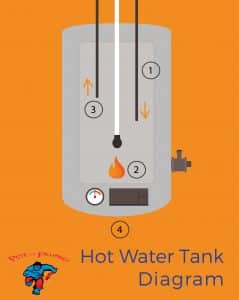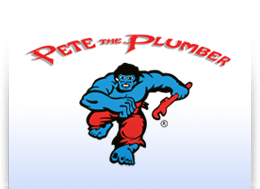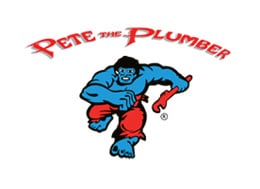
You get ready to thaw out, turn on the water in the shower and…. only an ice-cold flow.
We’ve all been there.
The hot water tank usually breaks down just when we need it most.
Did you know that taking a few simple prevention steps can ensure that this won’t happen to you?
A regular hot water heater inspection should be on every Calgary homeowner’s list of chores.
Here we’ll take you through what you need to know about your hot water tank, how to conduct an inspection and maintain it so that it stays in tip-top condition, and what to do when something goes wrong with it.
How Does a Water Heater Work?
Calgary homeowners rely on hot water heaters to provide hot water for showers, washing dishes, laundry, and much more.
In fact, the average Canadian home uses 75 Litres of hot water every day and hot water heaters account for 19% of the energy used in the average Canadian home.
Most of us take hot water for granted until something goes wrong, though.
Just like any other appliance in a home, water heaters sometimes need maintaining or repairs. Old ones may need replacing.
Understanding a few basics of how hot water tanks work will help you see the need for maintenance and regular inspection.
Whether you have a gas or electric water heater, they generally work in a similar fashion:
- Cold water enters the tank through a dip tube.
- Water is heated using a gas burner (with hot, toxic air released through a chimney which heats the surrounding water) or electric heating elements inside of the tank (in which case the tank is plugged into an electric supply).
- The hot water rises in the tank and travels around the plumbing system of the home through a heat-out pipe.
- The thermostat, temperature, and pressure relief valve, and drain valve regulate water temperature and flow.

How To Check Your Hot Water Heater
As mentioned, regular maintenance can help keep your hot water tank in good, working condition.
But what do you need to be on the lookout for when checking your water heater?
As the first line of defence, you can regularly check for tell-tale signs that your water heater is not working to full capacity.
Signs that the water heater is not working
Sometimes, there are clear signs of a hot water heater requiring attention, including:
- Running out of hot water more quickly in your home (without increasing consumption)
Having to wait for showers after running the washing machine (a suitably-sized hot water tank should be able to handle both)
Leaks or strange noises coming from the tank (more about this in the below section)
Rust-coloured water
No heating of water at all
Note that while it is a good idea for a homeowner to check a water heater from time to time, nothing should replace a professional inspection if you suspect problems or have not had your tank serviced for a while.
Some maintenance measures that may be performed on your hot water tank include:
Flushing out sediment from the tank once a year
Changing the anode rod, which protects your tank from rust every 5 years
Setting the thermostat on the heater to a safe temperature that will keep heating bills down (normally around 120 degrees)
Attempting repairs yourself can be dangerous and you run the risk of burning yourself with scalding hot water.
Also, never attempt to install a water heater on your own. Call a professional plumber.
Why is it important to inspect your water heater?
If you fail to inspect your water heater, problems will creep up and then, one day, you will encounter a flooded basement or simply no hot water for washing up.
Inspections help you identify problems early so that they can be repaired, rather than having to replace the entire tank, which gets expensive.
Prevention is better than cure here; regular hot water tank inspections and maintenance will prevent small issues from becoming large problems.
Four important things to inspect
The most important four things to check during a hot water tank inspection are:
1. Age
Water heaters generally have a lifespan of 10-12 years. If your heater is within this range, keep a regular eye on it for the tell-tale signs outlined above.
Some heaters have a label on the front that details the installation date. This should provide a good idea. Otherwise, the age of your home might be the age of the heater too.
2. Leaks
Major leaks are normally quite easy to spot.
However, if you have a raised heater, use a step-stool and a flashlight to check the tray at the bottom of the tank to see if there is water.
Also, look for mineral deposits, as water that has leaked earlier may have dried up.
Next, check the top of the unit to see if any of the pipes, valves or connections are leaking. If you find water or leaks, call a plumber immediately.
3. Rumble Noises
Is your heater regularly emitting rumbling or grumbling noises when you turn the water on in certain places or when it’s heating the water?
Another warning sign could be a high-pitched whining sound.
In either case, beware! It could be a sign that repairs are needed or it’s replacement time.
4. Temperature
The temperature setting on your heater should not be too high or too low.
Adjust it to a level that produces enough hot water for your needs each day without it racking up a huge bill every month.
If the amount of hot water produced starts declining for no apparent reason, it could be a sign that something is wrong with the heater.
When To Call a Plumber?
To recap, you definitely need to call a plumber if you detect any of the following during a hot water tank inspection:
- Leaks around your tank
- Rust-coloured water
- A foul odour coming from your tank
- A rumbling or high-pitched sound coming from the tank
- Less hot water being produced (compared to before)
We’re Calgary’s #1 voted plumbing service provider and specialize in hot water tank inspections, repairs, and installations.
If you’re concerned about the performance of your heater or just want to make sure that all is well with the unit, call Pete the Plumber at (403) 257-1766.
We’ll arrange a visit to see what the problem is and advise if repairs or a replacement is required.

